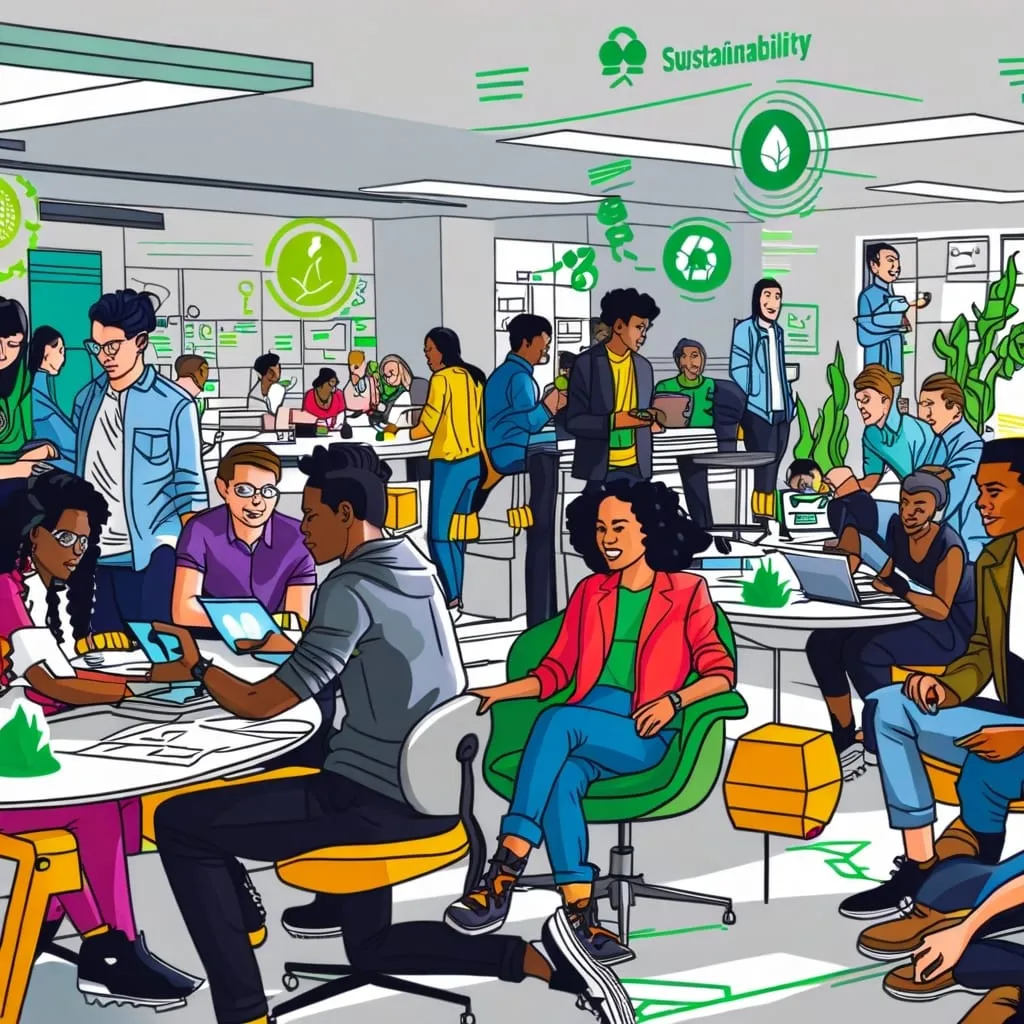Embracing Gen Z: A New Era of Leadership
The workforce landscape is shifting dramatically as Gen Z enters the professional world. Born between the late 1990s and early 2010s, this generation is bringing fresh perspectives and unique expectations to the workplace. For leaders, this presents both challenges and opportunities to evolve their management styles.
Purpose-driven leadership is taking center stage. Gen Z isn't just looking for a paycheck; they want meaningful work that aligns with their values. They're interested in how their employers invest in sustainable practices and contribute to society. Leaders who can tap into this desire for purpose are more likely to engage and retain Gen Z talent.
Work-life balance is no longer a perk; it's a necessity. Gen Z prioritizes mental health, flexible work hours, and ample vacation time. Smart leaders are responding by creating open dialogues about these needs and offering flexible arrangements. It's not just about being nice; it's about reducing turnover and boosting productivity.
Gone are the days of "because I said so" leadership. Gen Z responds to leaders who walk the talk, demonstrating vision and authenticity. They want to learn from their higher-ups, but they also expect to be heard. Placing passionate Gen Z employees in impactful roles can spark innovation and fresh ideas.
Tech-savvy doesn't even begin to describe Gen Z. As digital natives, they're comfortable with the latest tools and platforms. Leaders who leverage this tech fluency can drive digital transformation and stay ahead of the curve. It's not just about using new software; it's about embracing a digital-first mindset.
Authenticity and inclusivity are non-negotiable for Gen Z. They're looking for workplaces that value diverse perspectives and foster open dialogue. Leaders who create inclusive environments are more likely to build trust and enhance teamwork. It's not just about ticking boxes; it's about creating a culture where everyone feels valued.
Continuous learning is the name of the game for Gen Z. They're eager to expand their skills and stay ahead of industry trends. Smart leaders are providing opportunities for formal and informal learning, from mentorship programs to on-the-job training. It's about creating a culture of growth and adaptability.
Servant leadership is resonating with Gen Z. This style emphasizes empathy, humility, and genuine care for team members. Gen Z appreciates leaders who are supportive and willing to forgive mistakes. It's about building strong relationships and fostering a positive work culture.
Flexibility in management style is crucial. Gen Z values meaningful work, ownership of tasks, and a sense of belonging. Leaders need to be adaptable, adjusting their approach to meet individual needs. Regular check-ins and clear expectations go a long way in keeping everyone on track.
The entrepreneurial spirit of Gen Z is a valuable asset. These young professionals are innovative and not afraid to challenge the status quo. By giving them the freedom to operate independently and come up with fresh ideas, leaders can drive creativity and growth. Recognizing their successes can further motivate them to push boundaries.
Transformational, democratic, and coaching leadership styles are hitting the mark with Gen Z. Transformational leaders inspire through shared vision and personal growth. Democratic leaders encourage open communication and shared decision-making. Coaching leaders focus on developing skills through mentorship and feedback. It's about finding the right mix to bring out the best in Gen Z employees.
People-focused leadership is key. Gen Z workers respond best to leaders who see them as individuals with unique motivations and aspirations. Authenticity is crucial; Gen Z can spot fake leadership from a mile away. Leaders who are transparent, reliable, and committed to their team's growth are more likely to earn respect and loyalty.
Walking the culture talk is essential. Gen Z has zero tolerance for toxic cultures or misalignment between words and actions. Leaders need to establish safe and inclusive work environments, align expectations, and live up to their values. It's about having honest conversations and creating a workplace that fits with personal lives.
Investing in Gen Z early on pays dividends. Providing growth opportunities, face-to-face interactions, and clear expectations helps retain talent and ensures Gen Z workers feel valued. Regular check-ins and one-on-one meetings provide coaching moments and keep everyone on track.
Consider a tech company that's embraced flexible work policies. Employees choose their hours and work from home when needed. This approach improves work-life balance and shows trust in the team. The result? Higher satisfaction and lower turnover rates.
In the financial sector, giving young leaders room to innovate can be a game-changer. By encouraging calculated risks and fresh ideas, financial institutions can stay ahead of the curve and drive growth. It's about harnessing Gen Z's entrepreneurial spirit to push the industry forward.
Leaders who encourage open dialogue and empower their teams to make decisions are seeing positive results. Take a marketing agency that's adopted a more democratic approach. Team members are actively involved in strategy discussions and decision-making processes. This fosters a sense of ownership and responsibility among Gen Z workers.
The shift towards purpose-driven work is evident across industries. A sustainable fashion brand that prioritizes ethical production and environmental responsibility is attracting top Gen Z talent. These young professionals are drawn to companies that align with their values and make a positive impact.
In the tech industry, continuous learning opportunities are becoming a major draw for Gen Z. Companies offering regular workshops, mentorship programs, and access to online courses are seeing higher engagement and retention rates. It's about creating an environment where growth is constant and curiosity is rewarded.
The emphasis on mental health and well-being is reshaping workplace cultures. Forward-thinking companies are offering resources like counseling services, meditation rooms, and wellness programs. These initiatives show Gen Z workers that their holistic well-being is valued, not just their productivity.
Inclusive leadership is making waves in traditionally hierarchical industries. A law firm that's embraced diverse perspectives and encouraged input from all levels is seeing increased innovation and client satisfaction. Gen Z lawyers feel empowered to contribute their unique insights, leading to more creative problem-solving.
The concept of work-life integration is gaining traction. Companies are moving beyond just offering flexible hours; they're creating environments where personal and professional lives can coexist harmoniously. This might look like on-site childcare facilities or policies that support side hustles and passion projects.
Transparency in leadership is becoming a competitive advantage. Organizations that openly share information about company performance, challenges, and decision-making processes are building trust with their Gen Z employees. This openness fosters a sense of belonging and shared purpose.
The rise of social media has influenced Gen Z's expectations of leadership visibility. CEOs and executives who maintain an authentic presence on platforms like LinkedIn or Twitter are more relatable to young employees. It's about breaking down barriers and showing the human side of leadership.
Collaborative workspaces are evolving to meet Gen Z's needs. Companies are creating environments that balance privacy with open areas for teamwork. These spaces reflect the generation's desire for both independent work and social interaction.
Sustainability initiatives are becoming a key factor in attracting Gen Z talent. Companies that demonstrate a genuine commitment to reducing their environmental impact are seen as more desirable employers. It's not just about recycling bins; it's about integrating sustainability into the core business model.
The gig economy has influenced Gen Z's approach to work. Even in traditional employment settings, they value project-based work and clear objectives. Leaders are adapting by creating more fluid team structures and focusing on outcomes rather than hours worked.
In conclusion, managing Gen Z requires a multifaceted approach that prioritizes purpose, authenticity, inclusivity, and continuous learning. Leaders who embrace these values and adapt their styles are creating more engaged, productive, and innovative workforces. As Gen Z continues to shape the future of work, flexibility, support, and genuine commitment to employee growth are becoming the hallmarks of effective leadership. The workplace is evolving, and those who can navigate this change will be best positioned for success in the new era of work.






